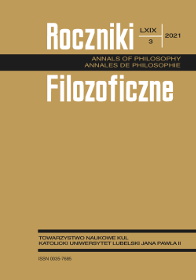Benevolence or Mercy? The Problem with the First Premise of the Hiddenness Argument
Abstrakt
Dobroczynność czy miłosierdzie? Problem pierwszej przesłanki argumentu z ukrytości
Pierwsza przesłanka J. L. Schellenberga argumentu z ukrytości zrównuje miłość Boga z pozytywnym stosunkiem do człowieka. Aby zilustrować tę relację, posłużono się ludzkim modelem miłości rodzicielskiej, opartym na standardach współczesnego amerykańskiego liberalnego świata, a nie na standardach biblijnych. W rezultacie przypisujemy Bogu wąsko rozumiany horyzontalny stosunek do ludzi, który jest zupełnie obcy pojmowaniu miłości wypracowanemu w tradycji chrześcijańskiej. Kiedy odwołamy się do klasycznego teizmu, który uznawał miłość za centralny przymiot Boga, zobaczymy, że należy ją rozumieć w modelu wertykalnym, polegającym na ofiarowaniu dobra i miłosierdzia (łaski). Takie rozumienie podważa teizm dobroczynności i zastępuje go teizmem miłosierdzia (łaski). Dzięki temu okazuje się, że pierwsza przesłanka argumentu z ukrytości jest bardzo wątpliwa, a cały argument wymaga znaczącej rewizji.
Bibliografia
Aquinas, Thomas. Summa Theologica. Translated by the English Dominican Fathers. Vol. 1, 1a QQ. 1–119. Notre Dame, IN: Ave Maria Press, 2000.
Aristotle. Nicomachean Ethics. Translation and historical introduction by Christopher Rowe, philosophical introduction and commentary by Sarah Broadie. Oxford: Oxford University Press, 2002.
Bernard. On Loving God. Cistercian Fathers Series 13B. Analytical commentary by Emero Stiegman. Kalamazoo, MI: Cistercian Publications, 1995.
Brummer, Vincent. The Model of Love: A Study in Philosophical Theology. New York: Cambridge University Press, 1993.
Green, Adam, and Eleonore Stump, eds. Hiddenness Divinity and Religious Belief. New Perspectives. Cambridge University Press, 2015.
Howard-Snyder, Daniel, and Paul K. Moser, eds. Divine Hiddenness: New Essays. Cambridge: Cambridge University Press, 2002.
John Paul II. Dives et Misericordia. In Pope John Paul II. Encyclicals. Trivandrum, India: Carmel International Publishing House, 2005.
Kavanaugh, Kieran, ed. John of the Cross: Doctor of Light and Love. New York: Crossroad Publishing, 1999.
Kowalska, Faustina Maria. Diary. Divine Mercy in My Soul. 3rd ed. Stockbridge, MA: Marian Press, 2003.
Moser, Paul K. “Divine Hiddenness and Self-Sacrifice.” In Green and Stump, Hiddenness Divinity and Religious Belief, 71–88.
Nygren, Anders. Agape and Eros. Translated by Philip S. Watson. London: S.P.C.K., 1957.
Outka, Gene. Agape. An Ethical Analysis. New Haven and London: Yale University Press, 1972.
Rea, Michael C. “Hiddenness and Transcendence.” In Green and Stump, Hiddenness Divinity and Religious Belief, 210–25.
Rea, Michael C. The Hiddenness of God. Oxford: Oxford University Press, 2018.
Rougemont de, Denis. L’Amour et l’Occident. Paris: Librairie Plon, 1956.
Schellenberg, J. L. Divine Hiddenness and Human Freedom. Ithaca, NY: Cornell University Press, 1993.
Schellenberg, J. L. The Hiddenness Argument: Philosophy’s New Challenge to Belief in God. Oxford: Oxford University Press, 2015.
Copyright (c) 2021 Roczniki Filozoficzne

Utwór dostępny jest na licencji Creative Commons Uznanie autorstwa – Użycie niekomercyjne – Bez utworów zależnych 4.0 Międzynarodowe.





